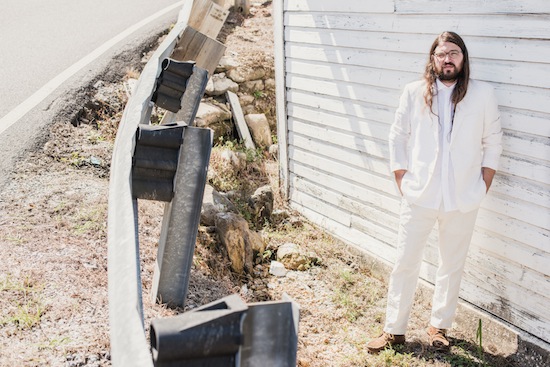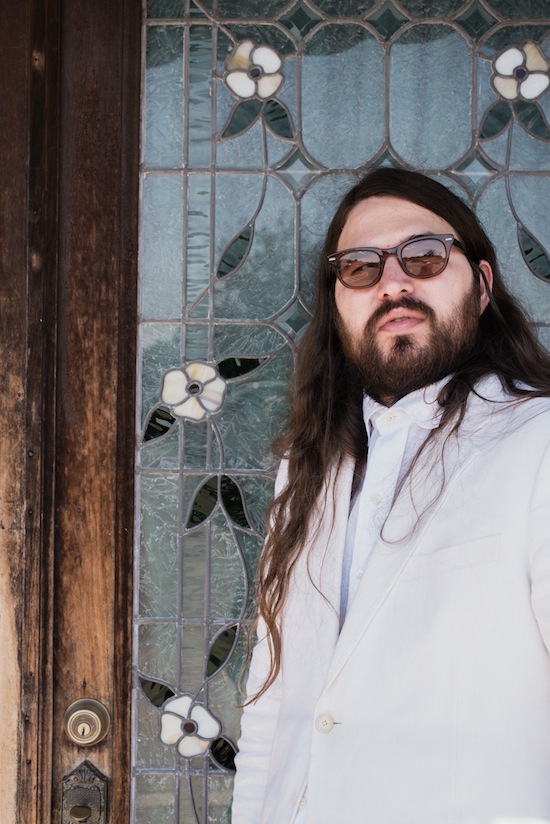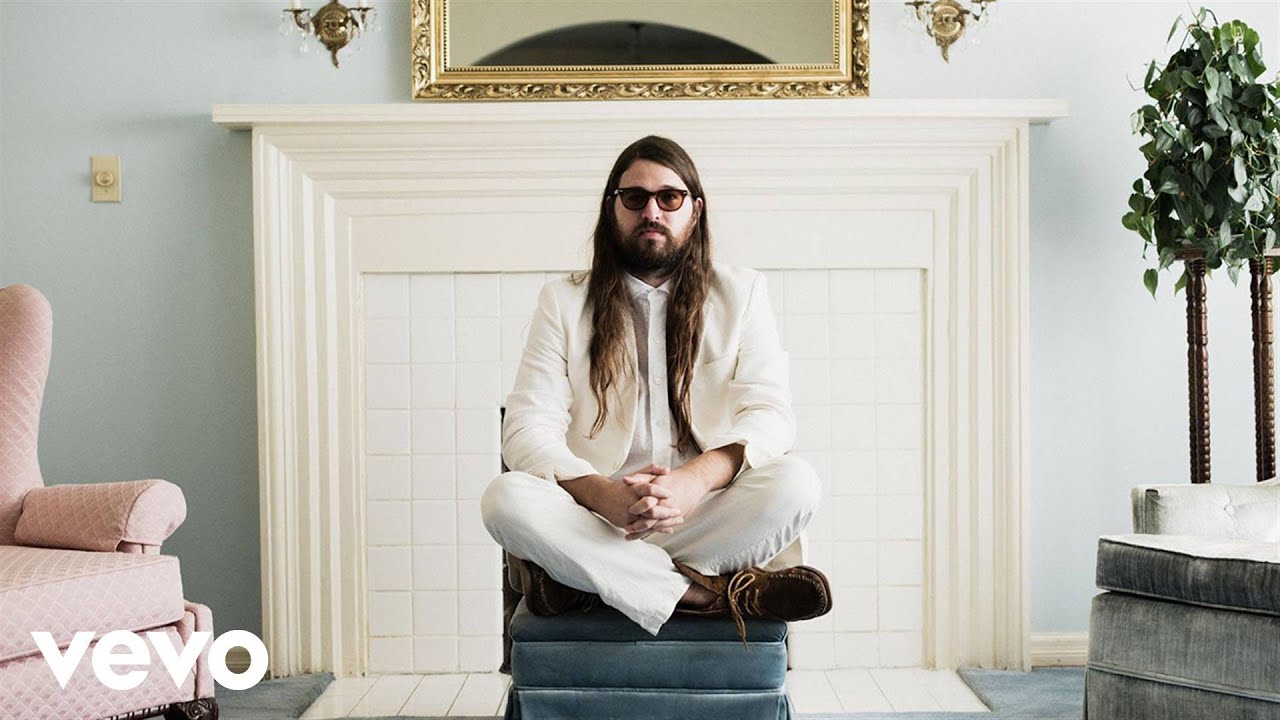Matthew E White is an interviewer’s dream.
"I generally like talking to music writers," he says, taking a sip from his beer. So far so good, but it’s not just talk for talking’s sake. Matthew E White is a genuinely interesting character with a story to tell. At 6ft 3in, the 32-year-old Virginian is a man mountain, and with his flowing locks, bushy beard and glasses he bears more than a passing resemblance to The Fast Show‘s Professor Denzil Dexter. White is also a success story that flies in the face of conventional wisdom. At a time when sales of recorded music are in decline and back catalogues keep many labels afloat, Matthew E White set up Spacebomb, which is not only a record label but also a recording studio complete with a house band made up of a crack squad of musicians and arrangers in the tradition of Motown or Stax.
A big risk to be sure, but White’s first album, 2012’s Big Inner, was showered with the kind of hosannas usually reserved for The Next Big Thing. Its high production values, including horn and string sections and a choir, were matched by White’s elegant and sympathetic skills as a songwriter. With a lush and rich sound that’s recognisably rooted in America’s long heritage of homegrown music, Big Inner harked back to a different age yet its concerns were very much rooted in the here and now whilst simultaneously achieving a timeless quality. Propelled into the wider world, White spent the next 18 months on the road, bringing his debut to Glastonbury, the Hollywood Bowl and the Sydney Opera House among others.
The success of Big Inner made a huge impact on White and Spacebomb, but the punishing schedule resulted in extended bouts of insomnia and a case of shingles for White when he returned home. Still, you can’t keep a good man down and, with 2015 barely rolling out of bed, both White and Spacebomb are ready to go for it again. Natalie Prass’s eponymous debut, produced by White and Spacebomb guitarist and arranger Trey Pollard, is already making seismic waves and White’s second album, Fresh Blood, is out in March.
Fresh Blood is a step up from its predecessor. More panoramic and ambitious, it includes a meditation on the death of Philip Seymour Hoffman, a song about child abuse in the church, and a radio hit, ‘Rock & Roll Is Cold’, which contains serious intent beneath its almost goofy surface.
For an hour in an east London pub, White talks about the label, explains his vision and music, and clears up a misconception that has dogged him since the release of his debut.
You returned home to Richmond, Virginia after taking Big Inner all over the world and found yourself laid out. Was that culture shock, or exhaustion?
Matthew E White: It was exhaustion – pure exhaustion. I put my mind and body through a lot through those two years and professionally everything, for me, changed in ways that were profound. They were the two most exciting years of my life but by far and away they were also the hardest. It was hard on my body and my mind and when I finally got done with it, when I played the last show, it just put me on my back. All that energy that’s needed to play shows – when you’re done it’s like your body knows you need to lay on your back and it makes sure that you do that.
How do you consider the future? Are you in competition with yourself?
MEW: Yeah, I’m certainly in competition with myself. Most definitely. For me, my career is about making records and it’s about making records that are better than the ones before; it’s not about making records that are different. There’s a self-evaluation and a look inward every time I go into the studio. You’re trying to get something out of yourself that’s new and better-crafted than before. When I made Fresh Blood I was certainly trying to make a better record than Big Inner. And I will try to make the next record better than this one.
You have things you want to improve on and you have things that work, so you don’t want those to go backwards. It’s hard. It’s like herding cats, and it’s difficult to wrap your energy around that. But I think that’s the attraction of making records – it’s so full of intangibles and that’s fun to juggle. It’s an adventure every time in things that are immeasurable, and I like that a lot.
Your music is incredibly well-crafted, but what comes first – the song or the sound?
MEW: The song. Records are all about songs. There has never been a record that has 10 good songs on it that was a bad record. It doesn’t matter who played it or what instruments they played or how bad their voice was or where and how it was recorded, if it has 10 good songs on it then it’s a good record. That’s what records are about. I’ve chosen a vocabulary to support those songs with. I believe in the vitality of production supporting those songs in ways that make those songs better. I always think that more is more but I definitely don’t think that less is more. There’s a way in which production and arrangement can interface with a song’s lyrics that adds a third dimension that’s really cool.
‘Rock & Roll Is Cold’ is a good example of that. If I was singing that and it was loud and angry then it would be a different kind of song. It’s a little bit of a sly song because the lyrics are slightly aggressive and they have an attitude about them but the song is very happy and kind of fun, so it changes what I mean slightly. I really believe in that. You can do it in a variety of ways, but that’s what I do. I take a song and make arrangements around it.

Is the process organic or is more analytical?
MEW: There’s a book in my pocket called Fresh Blood: A Look Back, and it goes through every single week we did and says what we did good and what we did bad as well as things that should stay the same and things that should be different. In that sense, I’m very aware of the process and what went well and what didn’t. I try to take stock of that because you can forget quickly, especially if people like the records. And if they don’t, you tend to have a revisionist history of what didn’t go well and I’m not particularly interested in doing that.
But you can only run as fast as you can run, so you can only grow as fast as you can grow. John Cage has a great quote about this: "Don’t call me an experimental composer. These aren’t experiments. I experiment at home and when I play it for the public these pieces are worked out and I know what I’m doing." I’m not interested in doing experiments in public. I want the painting to be complete. It should be well thought out and something that I believe in and not something that I think might work. That’s what makes a career in music exciting. There are a lot of things I want to get to, but I need time to get to them. I can’t do that in two years. I need 10 or 15 or 20 years to get to them. Hopefully over the long haul you’ll see that growth in my recorded output.
A lot of about making records is about wisdom and that’s a hard thing to obtain. Wise decision-making is a very hard quality to have. It’s not about making a right decision or a wrong decision; it’s about making a wise decision. You can solve a musical problem in a correct way but that doesn’t mean that it’s the wise way to solve a problem. That’s an important aspect of production and songwriting and music making.
Aesthetics always win over technology – they always interface but I would never put technology over aesthetics. At least, not the way my mind works!
How much of a gamble has Spacebomb been? It must be an incredible financial and artistic risk to employ a house band.
MEW: Spacebomb was a major gamble. But as an artist, all I can ask for is the ability to get within myself. If you don’t believe you should do that then there’s something not quite right. The truth is, I had a lawyer friend who wanted to start a record label and he had a little bit of money which he gave to me and said, "Do you think you can turn this into a business?" And I said, "Yeah, I think I can. I’m going to make a record." So he gave me his money, I made a record and now we have Spacebomb. It wasn’t a lot of money but it was enough for me to make a record. We needed that one record so it could expand into this whole thing. It was bit more complex than that, but not much. And it paid off.
There’s financially paying off and then there’s bringing goodwill and making good art and giving good energy to the world, and Spacebomb has done that quite a bit. It’s provided jobs for people and the musicians in my band are touring the world and making a living now, and that’s really great. That was all enabled by Spacebomb and I’m really proud of that. We’ve been a creative and artistic success and that’s part of the equation when you say how successful you have been. But for me there’s a lot more to say creatively and there’s a long way to go in terms of how much we have to give.
What do you see that destination being?
MEW: I don’t know. We’ve talked about it a bit and we’ve asked ourselves, "Where does this end?" There’s a huge spectrum of how it could end but I think it’s open. Spacebomb is committed to being really flexible. The idea was to have a business that’s really flexible in the industry today and whether it’s about making records or helping out with production then that’s fine. And if we look at the books one year and it’s not working then we’ll have to pack it up and spend time with our wives and children and that’s fine too. There are a lot of ways it could end. It’s about betting on ourselves. Let it ride, that’s what I say. Put the money back on the table and let’s make another record. We believe we have something to say and until that proves to be not true then we’ll keep on doing it.
It sounds like you’re keeping your head above the water, but are you swimming against the tide?
MEW: It’s been a slow process but we’re now running a business that’s artistically, creatively and financially above water and will be for the foreseeable future. Then again, record labels are about the worst business you could get into. It’s a huge risk every time but there’s something exciting about that. All of us who started the company, we love the wild west nature of the industry as it is now. We get off on it and we love taking a risk. We’ve been up against it – and I really mean up against it – and we love to see it pay off. We’re in that place in life where we can do that. It’s good and exciting.
Have you learned any lessons from the histories of Motown or Muscle Shoals or Stax?
MEW: Oh yeah. A major lesson we learned – and this is a little bit boring in that it’s about how we organise our business – goes like this: Steve Cropper goes into the offices at Stax and says, "I want a percentage of the ownership of this company," and the board says, "No. Get outta here!" So he says, "Fuck you guys," and he leaves. That’s what effectively ended Stax records. And as for Motown, they left the Funk Brothers in Detroit so they didn’t benefit in any way that was proportional to the way that Berry Gordy did. So in the beginning, the musical braintrust of Spacebomb is me, Trey Pollard and [drummer] Pinson Chanselle and there are now nine owners of the company and they are the company. If Spacebomb was to have a hit record and make a million dollars and Sony comes to us and says, "I want to buy your record company for $50m," then everybody who was in the musical braintrust would be compensated. But that Steve Cropper story really drives it home, so we try to be very fair.
Fresh Blood doesn’t shy away from big themes, most notably on ‘Holy Moly’ where you tackle the issue of sexual abuse within the church. As a Christian…
MEW: I’m not a Christian. That seems to be a lot of people’s understanding. I think that happened because of the last four minutes of ‘Brazos’ on the last record. I was coming out of nowhere and a lot of people wrote about that record without talking to me. That song is not of an honest narrator, it’s not me as a narrator – I see it as very ambiguous and much more darkly ironic with a lot of question marks and a lot more nuance than the original set of reviewers wrote about. Since then, I have to chase that a little bit. Which is perfectly fine. That is the nature of songs – they cease to be yours and when you’re doing things like switching narrators and you don’t make it abundantly clear or you leave things up to interpretation and nuance, then sometimes people get it wrong. That’s okay. But now that I’ve had a chance to talk to people about it then hopefully I’ll make myself understood. Because whatever questions you may have that relate to me being a Christian will now change now that you know that I’m not.
I don’t say that I’m not a Christian in any kind of aggressive anti-faith way. I’m sympathetic to any faith-based community and I’ve had really wonderful experiences in that community. All of my family is in that community – most of them professionally – and I say that more to be respectful to people who do use that title because, to someone like my parents, it means the world to them. That is what their life is. It’s purely that but I don’t want to be called that when I’m not doing what I think you need to do to use that title. And I really say that in a non-aggressive way. I’m not really bothered to be called a Christian – I don’t see that as a bad adjective but it’s just an inaccurate one.
I’m glad we cleared that one up! But the album still deals with big themes…
MEW: Absolutely! And I do use a spiritual and even Christian vocabulary. In ‘Circle ‘Round The Sun’ I use it as a metaphor or a lens to see different subjects, because that’s my past and I’m able to understand it and deal with its nuance in a way that makes some songs pop a little bit more. That’s just a songwriting device, to be really cold about it.
There are moments on the album where you use gospel embellishments. What is the appeal, then, of devotional music to you?
MEW: I was talking to someone earlier about gospel music and how important a tradition that it is. I think gospel music might be the most perfect genre of music that has ever existed. It has everything. It can be highly arranged; it can be very intellectual; it can be pre-set in really beautiful ways. It is also highly improvisational and super-flexible and very in-the-moment. It can be very loud or very soft and it has a huge dynamic in terms of the harmony and melody. It makes music as a group together. It’s very dynamic rhythmically and it has a sense of dynamic that’s similar to pop music with a sense of mood, and it makes you feel good. It’s really emotional and it deals with really serious themes. It’s serious music but it’s also serious dealing with the lighter side of things and it can be serious dealing with the darker side of things. But it also has to do with ensemble and it has to do with soloists. It has everything that you want. There is nothing that exists in any genre of music that you might like that’s not in gospel music.
I think it’s much more of a building block for soul, rock & roll, R&B than we think it is. You kind of see that with Ray Charles. He blatantly copied gospel music. I don’t know why that music is so magnetic but I’ve been thinking about this a bit. I like church music, hymns and certainly gospel music, and it’s like an interesting mirror or a proto pop music. It’s designed to be played to a large audience and for the audience to remember it and to be affected by it, and to be a vehicle for joy. And really, that’s what radio hits are designed to be. They’re designed to be easily accessed by an audience, they’re designed to be memorable and they’re designed, in the case of real radio hits, to make you happy and bring a real sense of joy and make you excited. Devotional music and church music is interesting in that sense. That genre has been very important to me as a style of music, and not related to my spirituality at all. It certainly isn’t a tradition I grew up with.

What’s interesting about Fresh Blood is that, despite using a huge ensemble to create it, the album sounds very intimate.
MEW: Albums are about songs and you have to treat the songs with respect. Your writing has to do that and your recording process has to do that and me and Trey are pretty aware of that. You find your spot where you can write big stuff and then you find your spot where you’re just a support with nuance and you’re transparent. If a song requires a soft touch then you give it a soft touch.
If you take a song like ‘Holy Moly’, that song is about frustration and how that frustration turns to anger which then becomes hurt and trauma in a way that’s not just anger. In terms of abuse, anger is part of the way that you’re feeling or part of a wide variety of feelings, as I understand it. And that’s all in the song. The first part of the song is like, "Why does this have to happen?" and then it gets into a much more aggressive version of that, but in the end there’s also a sense of hope there: "I will not fear anymore… I will not fear anymore," and I’m singing it over and over again and in the end the fight is almost about a powerful trust in hopefulness more than it is about a pure, deep-seated anger. It’s a little bit ambiguous.
Going back to production, you want songs to be effective in more ways than just chords, lyrics and melody. ‘I Heard It Through The Grapevine’ is a classic example of that. That’s an A- song if you just sat down at the piano and played it but it’s A+++ in its production. It’s like that with ‘Holy Moly’. It’s an above-average song but it’s not at the top of the heap if I just played it on guitar, but when you’ve made a couple of recorded production decisions then it takes it beyond simple chords, melody and lyrics and you can get to a lot of other stuff. A lot of music is about that – about that double narrative of what are the words saying and how the production interfaces with that. It makes things jump out more and it asks questions – that’s what I love about recorded music.
That’s something that’s very much in evidence in ‘Tranquility’, a meditation on the death of Philip Seymour Hoffman. What drew you to that story?
MEW: He was everything an artist would want to be. He was the best at what he did and he wasn’t afraid to use that talent in a wide variety of ways. He did Mission Impossible III, he did The Hunger Games, these massive movies, and he wasn’t afraid of those. He didn’t do them for the money, he did them because it’s fun to make big pop movies and he was great in that environment. He was the best thing on the screen in Mission Impossible III but he also did really small movies and ran a small experimental theatre company. That whole spectrum of using your craft and interfacing with culture in different ways and doing it good no matter what the cost was is incredibly exciting to me as an artist. When he died that was a big deal to me and I wanted to write a song about him; I feel he deserves it. You don’t want the last relationship you had with him to be reading about him dying on the floor of his bathroom. That’s a part of the story and to some degree he chose that, but it is part of the narrative and you have to put that in context against the art that he gave.
‘Rock & Roll Is Cold’. Discuss.
MEW: I have a good answer for this. I think it’s important to say that this song is playful – it’s almost a little tongue-in-cheek. It’s a fun song but the reality is that rock & roll is almost 65 years old and it’s been codified in universities and it’s been codified in interviews and it’s been codified in that it has a hierarchical structure and that people are spokespeople for it and anytime you look back on a genre more than you look forwards then it gets a little bit ungraceful in the way that it’s ageing. I would say confidently that rock & roll is finished as a movement. Rock & roll, what it was, is done.
But I also think it’s important to say that individual music moments – music as it relates to us in our lives – isn’t about movements, it’s about relationships with individual songs, albums or artists. I see it how we relate to jazz. Jazz, as a movement, is done; it’s finished. But that doesn’t mean that I can’t step into a club and listen to a record and find something great. It’s alive in that person and I think rock is like that. There are things out there that are lively and important but as a movement, it’s done. The other part of the lyric that’s important to understand is, "R&B is free". Why? Rock & roll came from the black American experience and it immediately distanced itself from that. Pat Boone started covering Little Richard songs, Elvis Presley was there immediately and The Rolling Stones, as good as I think they are – and they are very, very good – are a caricature of Muddy Waters. Rock & roll floated away from the lifeblood of how it started and it has frozen out there.
You look at genres like R&B and they’re much closer to the black American experience with artists like Frank Ocean or Kanye West or Kendrick Lamar or Beyoncé – that music is alive and it’s fresh and it feels good. It’s not always good but it doesn’t have the same rigidity that rock & roll has. And I think it’s because R&B is close to that lifeblood, and the black American experience has been a source of incredible culture and art for the United States for a long time. It still is the primary moving force in culture. That’s an important thing to consider when you look at what’s happening to rock and R&B and the music that people are paying attention to.
You know, I’m an armchair critic and I’m not writing any of this in a book but I do believe it and so I’ve put it in a song in a much simpler and distilled way. It’s a serious conversation but it’s not that serious. To me, that’s one of the fun things about music and talking to music writers. Part of the fun of music is putting the subject on the table and talking about it. Music brings us together and that’s part of why we’re in this. And with ‘Rock & Roll Is Cold’ I’m doing that in a musical way. It was fun to write and it’s probably the most radio-friendly song on the record but it is serious – you can have a serious discussion about it or you can have non-serious discussion about it, and I like that.
Where do you see your music going next?
MEW: Oh, man! I don’t know! But as to where I’d like to steer it next then that’s something I know a little bit about. For me it’s about establishing the vocabulary that I’m working with and it’s about how far I can stretch that. What can I do with that sort of process? How much can I get out of that vocabulary? And so you’re always introducing new things and, for me, it’s about making something better and not making something different. It’s about making highly original music. I want Fresh Blood to be better than Big Inner and I want the third record to be better than Fresh Blood. I think of non-musical artists, like visual artists or architects and people like that who have a long history of getting better and improving and maturity, and that’s the kind of thing that I want to do. I want to look at something that I do in 10 years or in 20 years and I want it to be a real, honest progression.




